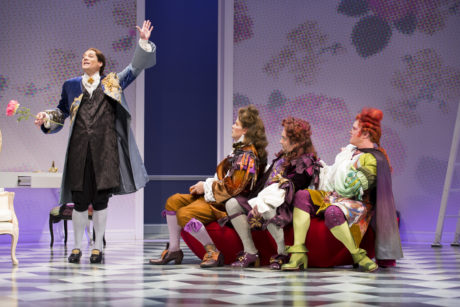It’s a classic art-imitating-life-imitating-art situation: to make a production relevant, the director decks out the cast in modern dress to create the illusion that Shakespeare was writing about our time. Then, to heighten the illusion, he scatters actors throughout the audience to ‘stage’ a demonstration—only to find the cast shouted down by real protestors, who are offended by exactly how relevant this production has become.
Julius Caesar is William Shakespeare’s play about the tragic consequences of assassination—what happens, as its director Oskar Eustis put it, “when you try to preserve democracy by non-democratic means.” The alt-right backlash against Eustis’ Shakespeare in the Park production crystalizes the anger, and the Mark Antony-like misinformation and resentment, that simmers across this country in the hot summer of 2017.

I would argue that this kind of risk-taking is a damned good thing; if Eustis wanted nothing but standing ovations, he could have put everyone in togas. Instead he chose to stick his neck out, knowing that his staging would be misinterpreted, as all artistic efforts are these days.
Suddenly, the stage reflects the conflicts that rage on the airwaves, on the internet, in our homes. This is not a bad thing because it makes the theatre relevant again; we’re not just entertainers anymore, we’re citizens. From the theatre’s very beginnings in ancient Athens, theatre has been by, for, and about citizenship. Too often we theatre folk have forgotten this, to the detriment of both our audiences and ourselves.
Eustis should take pride in the heated conversation he has generated, because it gives theatre folk an unprecedented opportunity to talk to our neighbors and friends—total strangers, even—about our craft, and about what Shakespeare really says in this play. How profoundly he understands human nature, how easily all of us can turn from decent law-abiding citizens into a lawless, murderous mob.
But with pride in our art comes a responsibility to lead a deeper discussion. We need to talk about the bitter rivalries in Julius Caesar among Brutus and his co-conspirators, the way in which their appeals to democratic ideas were empty and self-serving, not unlike those of America’s liberal elite, who lost last year’s election.
Even as progressive artists demand that conservatives look in the mirror to examine their motives, we need to look at ourselves. Are we really serving our audience by constantly taking one side in the debate? Wouldn’t we better serve our community, and ourselves, by giving our conservative neighbors a fair shake and a hard listen?
We theatre folk need to think deeply about the uses of political theatre, about the rigors of the fine art of dissent. Because dissent is a fine art; to be effective and not merely sensational, it deserves careful attention to detail.

One example: in Washington, D.C., a production of David Ives’ comedy The School for Lies featured a prologue that briefly and pointedly lampooned the current administration. There were no catcalls, no Breitbart headlines, no Fox News hysteria. Why? Because it was done artfully. The satiric lines were delivered by an actor in seventeenth-century knee breeches and a hideous wig that looked nothing like the president’s do.
It worked in part because it was a prologue to a comedy inspired by the great 17th-century French comedian Molière. Like Shakespeare he was a keen observer of human nature; and Molière knew a thing or two about the politics of intimidation. Molière and Oskar Eustis could compare notes about what happens when a major sponsor withdraws his support.
Molière’s sponsor was none other than King Louis XIV, but when he tried to produce Tartuffe, a satire about religious hypocrisy, the French equivalent of the alt-right demanded King Louis shut down the play. It took years, major rewrites, and a silly new ending (in which the King’s men arrest the villain just in the nick of time) before it could finally get produced. It was a huge hit, of course; but pressure from the far right meant it would take time and serious thought to hit the stage. And when it did, audiences loved it.
Molière is a reminder that theatrical protest can thrive, even under severe censorship. And for generations of artists who struggled under totalitarian regimes in our own time, Molière and Shakespeare were guiding lights. In the darkest days of the Soviet Union, when dissident authors only existed in samizdat, type-written sheets handed secretly from hand to hand, great writers like Boris Pasternak and Mikhail Bulgakov couldn’t publish; but they could work on the classics. Bulgakov dedicated a whole play to Molière, and translated a Shakespeare play or two. Meanwhile Pasternak, the Nobel Prize-winning author of Dr. Zhivago, turned his hand to King Lear, and to Hamlet.
I remember being disappointed when someone told me Pasternak translated Shakespeare into prose; it took me years to realize why an accomplished poet, who could have written in any meter he chose, created an everyday Hamlet: because the prose enabled him to communicate directly, in contemporary Russian, through Shakespeare’s characters.

So when Soviet audiences crowded into the Taganka Theatre in Moscow, in its prime, under director Yuri Lyubimov, they could commune with Shakespeare. But it wasn’t just Shakespeare they came to hear, it was Pasternak; and it wasn’t just any actor playing Hamlet, it was Vladimir Vysotsky, the most dynamic singer-songwriter of his generation, symbol of the resistance to Communist oppression, right there downstage center, dressed in suit of solemn black.
It’s been said that Vysotsky never played Hamlet, he only played himself; but maybe that was the point. Pasternak’s prose, Vysotsky’s magnetic presence, created a Hamlet that the victims of a totalitarian regime desperately needed to see. The KGB couldn’t touch it; it was Shakespeare, after all, Vysotsky and Pasternak were only saying what Shakespeare wrote, right?
And when Vysotsky met his untimely death, Russians assembled by the thousands, as if it were a state funeral, burying their hero in the Hamlet costume that symbolized his role, his struggle, and his people.
We’re lucky, the government doesn’t register our laptops yet; and although our every move online is monitored, it’s by corporations who are too busy making billions off our free content to worry about what we’re actually saying. And so we say whatever we like online and onstage, we have that freedom; but we forget at our peril that with freedom comes profound responsibility.
It’s never enough for us just to say what we feel, we have to do it consciously, artfully, with respect for our audience, with respect for those we disagree with. Our point will be that much more powerful if we use our art to reach everyone, not just the converted.
Consider this: we memorize our lines for every show, and in our spare time we have, of course, memorized every note, every syllable to Hamilton—right? What if we turned our amazing skills of memorization to the document Hamilton devoted his life to defending: the Constitution?
What have we missed? Try Article 1, Article 2, the Bill of Rights. Try the amendments, all those mid-course corrections that remind us of the great unfinished business of democracy. And while we’re at it, how about the Federalist Papers; maybe not all 51 of Hamilton’s essays, but it wouldn’t hurt to dip into a few, you know? Have a look at John Locke, Tom Paine, Baron de Montisquieu, Adam Smith, the great thinkers of the Enlightenment who inspired this great nation.
Because we’re not just artists, we have never been merely players; we are citizens in the greatest democracy on earth, and if we want to keep it that way it is our responsibility to inform ourselves, deeply, the better to reflect on everything that happens around us.
LINKS:
Review: ‘Julius Caesar’ at the Public Theater’s Shakespeare in the Park by Richard Seff
Magic Time! ‘The School for Lies’ at Shakespeare Theatre Company by John Stoltenberg
Review: ‘The School for Lies’ at Shakespeare Theatre Company by Sophia Howes




